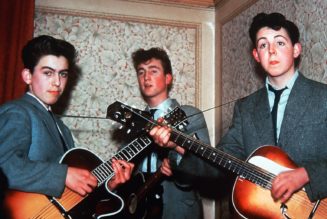All of these happy memories came flooding back as I listened to this curious old commercial — memories of a time of wonder and awe. But by the end of the commercial, more than anything else, I felt shame.
The Davises live in a small apartment on a busy road. In the summer, we can’t sleep with the windows open for all the pickup trucks and motorcycles. The back yard was entirely paved over to make a parking lot.
When my wife and I got married in 2019, we expected to put a down payment on a house in a year or two. Then COVID happened, and the economy took a nosedive. Now it seems like we have two options: leave New England (including all our family and friends) or rent until we’re in our forties.
I was brokenhearted — not for myself, but for my daughters. I hate that I can’t give them what I had. All people, but especially children, have an inalienable right to Nature. Tycoons and communists shouldn’t be allowed to buy up hundreds of square miles of farmland while young families can’t afford one-eighth of an acre for a house and tire swing. My daughters deserve at least that much.
All these thoughts are surging around my head as I sit at the kitchen table.
Then I look out the window.
Next door there’s a huge, abandoned house. The backyard is completely overgrown. No one’s lived there for two years except a family of possums. There’s a chain link fence between the two lots, which is overgrown with vines. And there I see, among the vines, a single sea rose in bloom.

 If there had always been sea roses growing on that fence, I’d never noticed. But seeing that flower at just that moment drew me even deeper into my reverie — only this time, it wasn’t like a time machine at all. I don’t know how to describe it except to say that, for a split second, I was a kid again. The sun seemed to shine brighter. The colors seemed more vivid. My habit of scanning and skimming, developed over years as an editor, went away. Everything held a new fascination for me. My eyes wanted to linger on every luscious detail. Everything seemed more enticing, more defined, more real.
If there had always been sea roses growing on that fence, I’d never noticed. But seeing that flower at just that moment drew me even deeper into my reverie — only this time, it wasn’t like a time machine at all. I don’t know how to describe it except to say that, for a split second, I was a kid again. The sun seemed to shine brighter. The colors seemed more vivid. My habit of scanning and skimming, developed over years as an editor, went away. Everything held a new fascination for me. My eyes wanted to linger on every luscious detail. Everything seemed more enticing, more defined, more real.
This feeling didn’t last for more than a second or two. Yet I remember sensing a certain duty — both thrilling and deeply solemn — to explore every nook and cranny of . . . well, everywhere. I felt like I had to. What’s more, I felt like I could. I seemed to belong out there, in the world. And the world belonged to me.
At that moment I realized two things, which are really the same thing.
First, my daughters are going to delight in the world around them as long as I don’t get in their way. Our three-year-old, Beatrice, loves nothing more than to splash in the puddles in our dismal parking lot. I mean that literally, too. I could tell her we’re going to have Birthday Soup with Little Bear, but if it’s raining outside, she’ll sob hysterically as I buckle her into her car seat.
Second, I wouldn’t be so down on our apartment — or our yard, or our neighborhood, or the world — if I could look at the world the way Bea does.
And I really don’t think that’s as hard as it sounds. What that reverie made me realize is that we see the exact same world as our children. In fact, we see the exact same world we saw as children. The difference isn’t “out there.” It’s in here: in my self. We allow ourselves to become bored and cynical. We take the world for granted.
* * *
Some months after the commercial in the kitchen, I found myself having beers with a friend of mine, a single man. We’ll call him Jeff. He said to me, “When you’re a kid, your job is to suck as much nectar out of life as possible. Then when you’re an adult, and you have a child, that part of your life is over. Now your job is to protect her while she sucks as much nectar out of life as possible.”
I told Jeff then what I’ll tell you now: that’s dead wrong. Popular culture feeds us this idea that marriage is the “ball and chain,” and that children are a nuisance. But that’s a lie. Yes: as a parent, you have to protect your kids. Of course. But didn’t the Master say, “Except ye be converted, and become as little children, ye shall not enter into the kingdom of heaven”?
I know this subject makes some Christians break out in hives. As with all the Lord’s teachings, our instinct is to explain it away — to “refine” and “clarify” our terms until we’re left with nothing but a truism. When this particular passage comes up, folks like to say, “We’re supposed to be childlike, but not childish.”

 Now, if you’ve ever thought that Jesus is telling us to wear sparkly Velcro shoes or eat random things we find on the floor like a toddler, let me disabuse you of that notion. Really, though: anyone who’s ever met a child knows exactly what Jesus means. He wants us to be kind and friendly, as children are. He wants us to be open and trusting, as children are. He wants us to be innocent, as children are. And he wants us to be wonderful — literally, full of wonder — as children are.
Now, if you’ve ever thought that Jesus is telling us to wear sparkly Velcro shoes or eat random things we find on the floor like a toddler, let me disabuse you of that notion. Really, though: anyone who’s ever met a child knows exactly what Jesus means. He wants us to be kind and friendly, as children are. He wants us to be open and trusting, as children are. He wants us to be innocent, as children are. And he wants us to be wonderful — literally, full of wonder — as children are.
As always, Chesterton put it best. “When we are very young children,” he said, “we do not need fairy tales. We only need tales. Mere life is interesting enough. A child of seven is excited by being told that Tommy opened a door and saw a dragon. But a child of three is excited by being told that Tommy opened a door.”
In fact, God Himself is childlike:








